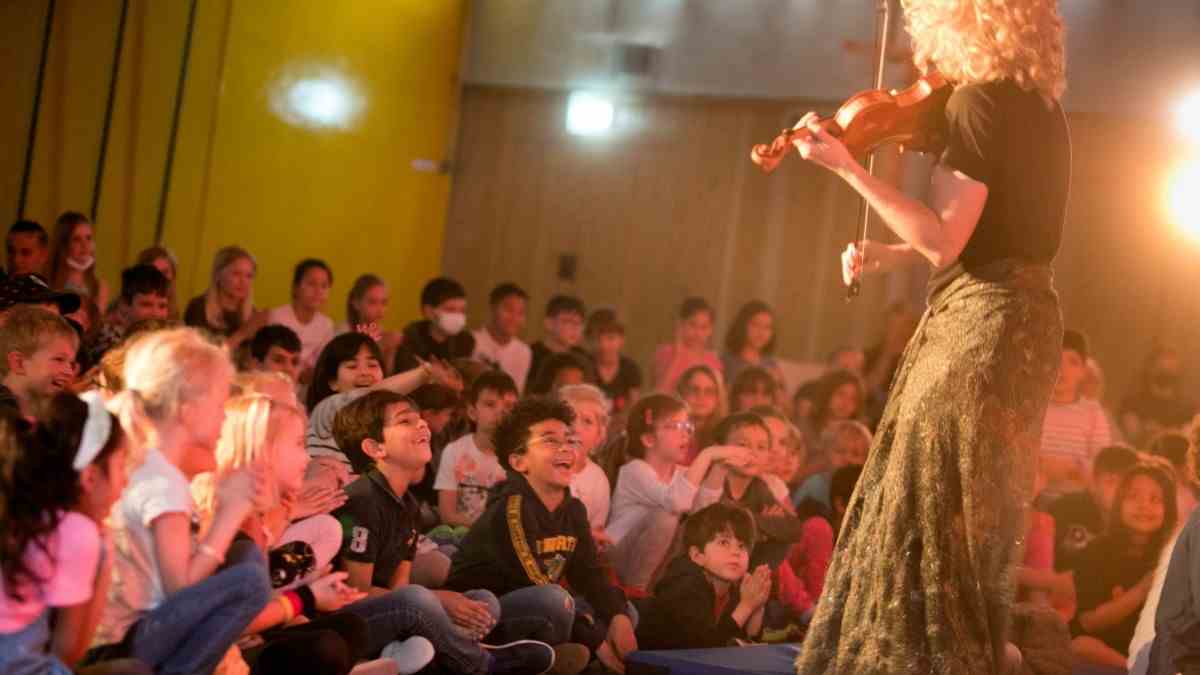The elementary school children grunt with enthusiasm. On stage, Circe has just turned Odysseus’ companions into pigs, and nearly 250 students in the gym are squeaking and grunting. They sit on blue gymnastics mats, on benches and vaulting boxes, comment with loud Ahs and Ohs when the harpist Magdalena Hoffmann and Thomas Reif with the violin are suddenly bathed in blue light and laugh when Thomas Reif makes his violin growl with the bow to emphasize that Odysseus and his companions are hungry.
Thomas Reif and Magdalena Hoffmann from the Bavarian Radio Symphony Orchestra tour primary schools to get children excited about music.
(Photo: Florian Peljak)
It’s Monday morning and the children at the elementary school on Burmesterstrasse are being visited by two musicians from the Bavarian Radio Symphony Orchestra. Magdalena Hoffmann with her harp and Thomas Reif with his violin give two performances in a row in the gym for half the school. They tell musically, with words and games, about the life of Odysseus and his odysseys. From the giant cyclops, from Circe and the sirens.
Magdalena Hoffmann wrote the children’s concert Odyssey a few years ago. When she was a child, her mother often read her the story of Odysseus and inspired her with his adventures. “The most important thing for me is to convey this enthusiasm,” says the 31-year-old. “I think everything that leads to more music in schools – in life in general – is great.”
Thomas Reif plays, walks through the rows, the children should see and hear the violin up close. When Magdalena Hoffmann attaches a large cardboard eye to her harp – the eye of the cyclops – and tells about a staff that Odysseus sharpens and hardens over the fire, many children get up, they want to see exactly what is happening on stage. A teacher gets up and walks around quietly, getting the children to sit down again.
The children especially liked this scene with the cyclops. “The way Odysseus put out his eye was great!” says fourth-grader Arthur. First grader Oskar thinks so too, it was funny, he says. Third grader Jana found the music beautiful, so beautiful that she almost fell asleep, she says. And that a friend of hers also plays the harp. Ayla says it was the first time she had heard such music, but she didn’t know that the big instrument was called the harp. And second grader Pablo says his mother has a viola. But since his little brother was born, he hasn’t played it anymore. Which he actually thinks is good, he says, because: Now she has more time for him.
All the children flail their arms in the air
The elementary school on Burmesterstrasse in the north of Munich applied for the concert, also because the children lack exactly such impressions after two years of the pandemic, says headmistress Ulrike Arndt. Something like this is very valuable, especially for the children who don’t go to the concert with their parents. “Here are real people making real music. That appeals to a lot of children and makes them want more.”
The two musicians are on a school tour in Bavaria for a week, they play in five primary schools, in front of more than 1800 children. “For many it will be one of the first contacts, for example with a harp,” says Maxie Neumann-Cosel from the Education department of Bayerischer Rundfunk. “It’s not an everyday instrument.” With the school tours, the music should reach the children, who would otherwise only be able to attend a concert at great expense; they too should take part. “We try to select the schools where it is not a matter of course that music takes place.”
When Odysseus and his companions escaped from the Cyclops’ cave, they rowed away from the island. All the children are waving their arms in the air, shouting and laughing and clapping over and over again. The performance is over after three quarters of an hour, and the children are now romping about in the playground. And Thomas Reif, for whom this was his first school concert, states: It is exhausting to play in front of such a large children’s audience. More exhausting than in front of the usual concert audience. And not just because the time at which the concert takes place is unusual for him: At ten in the morning, that’s when he usually starts practicing, says the 30-year-old.
“It’s exhausting to keep bringing the children to rest,” confirms Magdalena Hoffmann. “But it’s also a lot of fun when they grunt along.” She’s adept at quieting children. She has performed her play at many schools in Tyrol. The two have recently been playing it together, wanting to give children moments together in which they can experience instruments and music up close. “It’s something completely different than usual,” says Thomas Reif. “But the energy is great, better than when people in the audience don’t do anything.”
At least no one in the audience grunted in the large halls in which he played with the symphony orchestra on the European tour.

